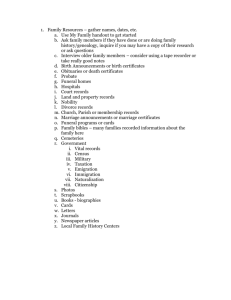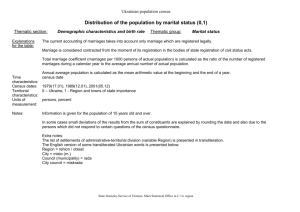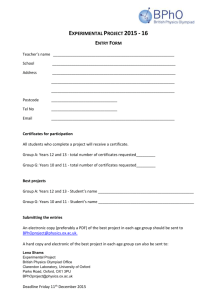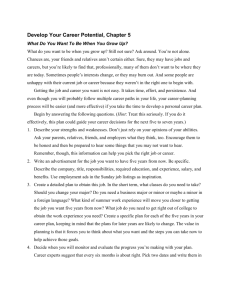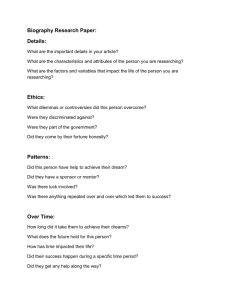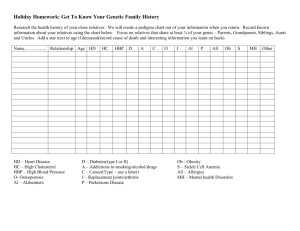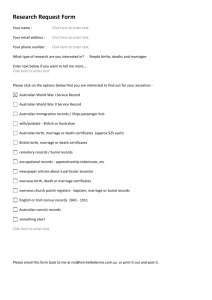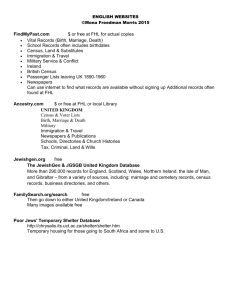Family History - Sainsbury Veterans Association
advertisement
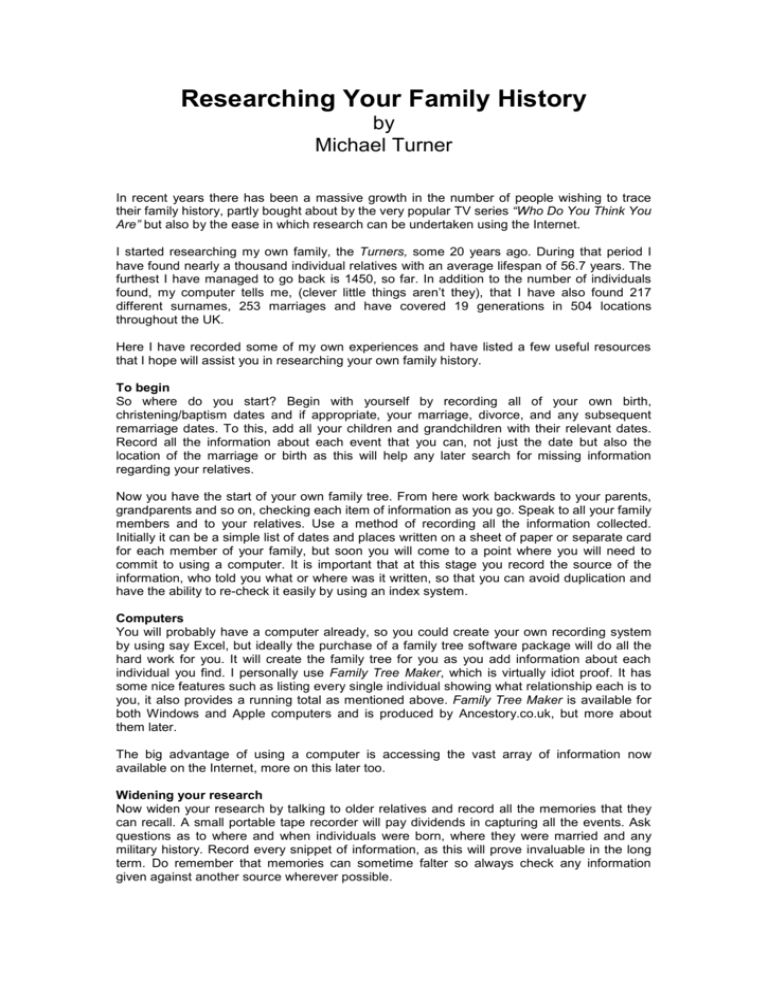
Researching Your Family History by Michael Turner In recent years there has been a massive growth in the number of people wishing to trace their family history, partly bought about by the very popular TV series “Who Do You Think You Are” but also by the ease in which research can be undertaken using the Internet. I started researching my own family, the Turners, some 20 years ago. During that period I have found nearly a thousand individual relatives with an average lifespan of 56.7 years. The furthest I have managed to go back is 1450, so far. In addition to the number of individuals found, my computer tells me, (clever little things aren’t they), that I have also found 217 different surnames, 253 marriages and have covered 19 generations in 504 locations throughout the UK. Here I have recorded some of my own experiences and have listed a few useful resources that I hope will assist you in researching your own family history. To begin So where do you start? Begin with yourself by recording all of your own birth, christening/baptism dates and if appropriate, your marriage, divorce, and any subsequent remarriage dates. To this, add all your children and grandchildren with their relevant dates. Record all the information about each event that you can, not just the date but also the location of the marriage or birth as this will help any later search for missing information regarding your relatives. Now you have the start of your own family tree. From here work backwards to your parents, grandparents and so on, checking each item of information as you go. Speak to all your family members and to your relatives. Use a method of recording all the information collected. Initially it can be a simple list of dates and places written on a sheet of paper or separate card for each member of your family, but soon you will come to a point where you will need to commit to using a computer. It is important that at this stage you record the source of the information, who told you what or where was it written, so that you can avoid duplication and have the ability to re-check it easily by using an index system. Computers You will probably have a computer already, so you could create your own recording system by using say Excel, but ideally the purchase of a family tree software package will do all the hard work for you. It will create the family tree for you as you add information about each individual you find. I personally use Family Tree Maker, which is virtually idiot proof. It has some nice features such as listing every single individual showing what relationship each is to you, it also provides a running total as mentioned above. Family Tree Maker is available for both Windows and Apple computers and is produced by Ancestory.co.uk, but more about them later. The big advantage of using a computer is accessing the vast array of information now available on the Internet, more on this later too. Widening your research Now widen your research by talking to older relatives and record all the memories that they can recall. A small portable tape recorder will pay dividends in capturing all the events. Ask questions as to where and when individuals were born, where they were married and any military history. Record every snippet of information, as this will prove invaluable in the long term. Do remember that memories can sometime falter so always check any information given against another source wherever possible. Birth, marriage and death certificates If family members have copies of birth, death or marriage certificate, or any other useful documents, ask if you can have photocopies and start a library of your own with a recording system that you can use to cross reference. For example if you have recorded a person’s birth add your own reference number to indicate the source of the information in case you need to check it at a latter date. Certificates are extremely useful sources of information. Birth certificates can tell us the names of the parents, maiden name of the mother and occupation of the father in addition to the date and place of birth. Marriage certificates contain similar information but most importantly the names of the couple’s father’s with their respective occupations. They will also contain the names of the witnesses who will probably be related to the bride or groom, all very helpful clues when going back a further generation. Other documents and sources Ask members of your family if they have any other documents that could aid your research. Wills, army call up papers, union cards, baptism certificates, and family bibles could contain useful information in locating the names and whereabouts of that elusive relative. I was fortunate enough to find my grandfathers medals from the Great War. These were inscribed with his name and very importantly his service number, which aided further research. Another useful resource that could take you back to the middle of the 1500’s are parish records, copies of these can generally be found in the county records office and some libraries. Many of these are now digitised and therefore available online. Gravestones also provide another source, but do recheck the information on the inscription as the person ordering the headstone may have assumed the person’s age from what they were told. When visiting the cemetery take photographs of the inscription on the headstone and also an overall shot showing the position of the gravestone relative to another main feature in the cemetery in case you need to locate it again, and don’t forget to jot down the name and address of the cemetery. If there is a notice board it may contain the name of the clergy or parish clerk, very useful for following up your search, note this too. Photographs can tell us a lot about an individual. The style of clothes will indicate the period when the photo was taken and a military uniform could give clues to rank, regiment, medals awarded and evern the period. Military Records The military were very proficient in keeping records of service personnel. Many of the records survive today, although some were lost during the bombing of London during World War 2. Try National Archives Online information There is an incredible array of information available online, some available free and some you will have to pay for. Ancestry.co.uk Ancestry.co.uk has it’s own inbuilt family tree which is useful whilst researching members of your family but it is very limited in the information it will hold. However, it has an extremely useful search tool, which allows others to see your tree and contact you, if you allow, with possible links to their tree. It has a 14-day free trial so you can see if it suits your needs. Make sure it is the .co.uk website and not the .com site which has a biased to American links. There are other similar websites that you may wish to explore. For example; My Heritage, Find My Past Also try GenUKI, which is not just a collection of links but has some useful introductory material. www.cyndislist.com has a vast array of links categorised by subject but again it is very much biased towards the American ancestry archives. For certificates of Births, Deaths and marriages go to the UK Government website https://www.gov.uk/browse/births-deaths-marriages/register-offices Census Returns When your research takes you back to 1911 there is an alternative to civil certificates, is the census returns. These are available from 1841 to 1911 at 10-year intervals. Those taken since 1911 are not available to the public until they are 100 years old. Census returns contain a host of invaluable information regarding your ancestors including a list of all inhabitants at the address listed. It records all their ages and occupations with their relationship to the head of the household. You could therefore, locate a whole family with one document. Again double check the information as the records were recorded from informants at the household who may not have been accurate regarding dates of births etc. Records are held at http://www.nationalarchives.gov.uk/records/research-guides/census-returns.htm. As it is not possible to view the census returns post 1911 it is sometimes difficult to trace more recent relatives who were alive during this period. However, there are a number of online services available to family historians. One is ‘Tracesmart’ www.tracesmart.co.uk which can help find that allusive relative, another is www.192.com . Both of these search facilities have the ability to check telephone directories and electoral rolls in addition to directors of companies. www.192.com has a very useful family records search facility too. The searches are carried out on a prepaid fee basis by purchasing credits online. Another online search organisation is www.thegenealogist.co.uk, which is also a subscription based search facility. The same organisation has a very useful mail order subsidiary called S&N who supply genealogy software, and parish records and census returns on discs. www.genealogysupplies.com Google This search engine is very useful in finding suppliers of family history software, research tools and also the ability to find some living people just by typing in their name. Local Groups The Federation of Family History Societies has local groups in most major locations. Here you can exchange views and share knowledge on many aspects of family history. They often have access to records, either on disc or online, that could prove useful in your research. To find your local group go to their website www.fhs.org.uk . They have a very useful guide ‘First Steps in Family History’ as a free download. Family History Fairs Throughout the year family history fairs are held to promote the vast array of family history paraphernalia. Here you can view and purchase books, storage binders, maps, postcards, directories, software, magazines, and much more. Check the magazines below for dates and venues. Other resources If you do decide that you would like to start researching your family history then check out the many monthly magazines on the subject. Three of the popular ones are Family Tree Magazine, Your Family History and Who Do You Think You Are. These magazines often list researchers, who will visit records offices, cemeteries and other locations to help find information on your behalf for a fee. These can be extremely useful, not only for their skills in genealogy but also by saving you time and travel costs. Other useful imformation Some of your relatives may be reluctant to hand over their precious documents or photographs so you may wish to invest in a portable sanner. I have used a Flip-Pal scanner, which is very portable and easy to use. Flip-Pal Example of a Birth Certificate A census return My Grandfathers medals from the Great War 1914-1918 He was sent out to France four times and four times he returned safely. Well, there are no excuses now; and there is no better time to make a start on your family tree than now. At times it will be frustrating, but the excitement of finding that all elusive missing link will be extremely rewarding, and seeing your own family tree in print will be much admired by members of your family. Happy hunting. Michael Turner © Michael Turner 2014
